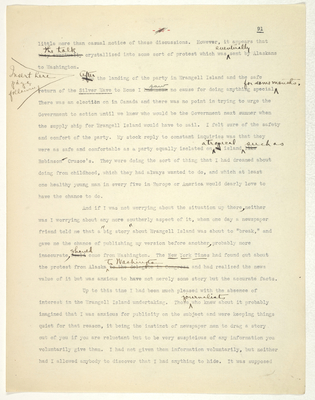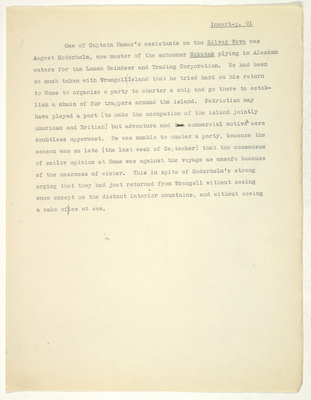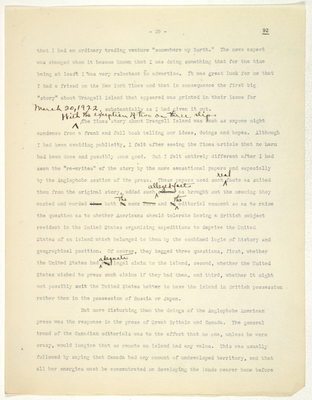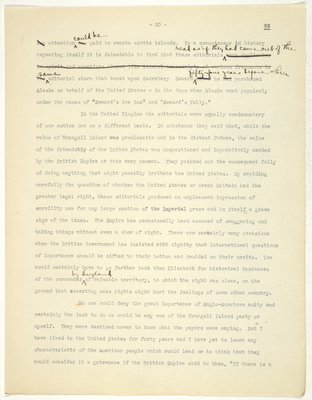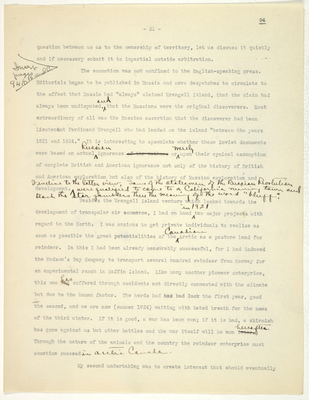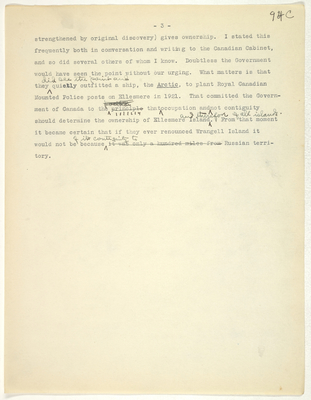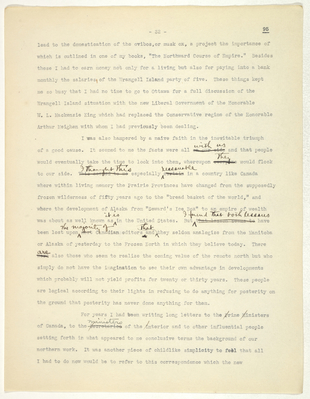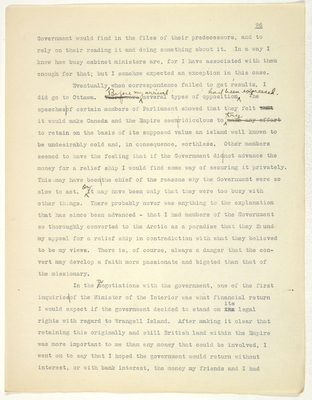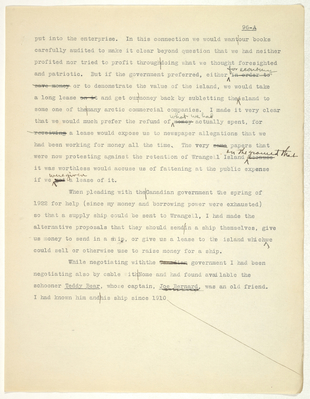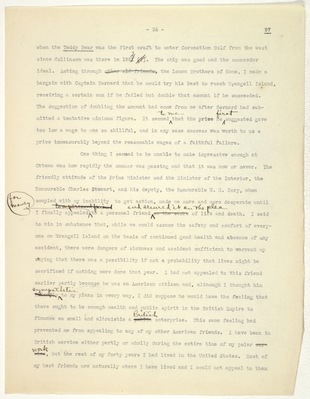Pages That Need Review
stefansson-wrangel-09-27
stefansson-wrangel-09-27-052
- 26 - 91
little more than casual notice of these discussions. However, it appears that the talk the eventually crystallized into some sort of protest which was eventually sent by Alaskans to Washington.
Insert here page following
From After the landing of the party in Wrangell Island and the safe return of the Silver Wave to Nome I saw had seen no cause for doing anything special for some months, There was an election on in Canada and there was no point in trying to urge the Government to action until we knew who would be the Government next summer when the supply ship for Wrangell Island would have to sail. I felt sure of the safety and comfort of the party. My stock reply to constant inquiries was that they were as safe and comfortable as a party equally isolated on a tropical an island like such as Robinson' Crusoe's. They were doing the sort of thing that I had dreamed about doing from childhood, which they had always wanted to do, and which at least one healthy young man in every five in Europe or America would dearly love to have the chance to do.
And if I was not worrying about the situation up there, neither was I worrying about any more southerly aspect of it, when one day a newspaper friend told me that a "big story" about Wrangell Island was about to “break," and gave me the chance of publishing my version before another, probably more inaccurate, should would come from Washington. The New York Times had found out about the protest from Alaska to Washinton to the delegate in Congress and had realised the news value of it but was anxious to have not merely some story but the accurate facts.
Up to this time I had been much pleased with the absence of interest in the Wrangell Island undertaking. Those journalists who knew about it probably imagined that I was anxious for publicity on the subject and were keeping things quiet for that reason, it being the instinct of newspaper men to drag a story, out of you if you are reluctant but to be very suspicious of any information you voluntarily give them. I had not given them information voluntarily, but neither had I allowed anybody to discover that I had anything to hide. It was supposed
stefansson-wrangel-09-27-053
Insert-p. 91
One of Captain Hamar’s assistants on the Silver Wave was August Soderholm, now master of the schooner Nokatak plying in Alaskan waters for the Lomen Reindeer and Trading Corporation. He had been so much taken with Wrangell Island that he tried hard on his return to Nome to organize a party to charter a ship and go there to establish a chain of fur trappers around the island. Patriotism may have played a part (to make the occupation of the island jointly American and British) but adventure and commercial motives were doubtless uppermost. He was unable to muster a party, because the season was so late (the last week of September) that the consensus of sailor opinion at Nome was against the voyage as unsafe because of the nearness of winter. This in spite of Soderholm's strong urging that they had just returned from Wrangell without seeing snow except on the distant interior mountains, and without seeing a cake of ice at sea.
stefansson-wrangel-09-27-054
- 29 - 92
that I had an ordinary trading venture "somewhere up North." The news aspect was changed when it became known that I was doing something that for the time being at least I was very reluctant to advertise. It was great luck for me that I had a friend on the New York Times and that in consequence the first big "story" about Wrangell Island that appeared was printed in their Issue for March 20,1922, substantially as I had given it out.
With the expedition of two or three ships the Times story about Wrangell Island was such as anyone might condense from a frank and full book telling our ideas, doings and hopes. Although I had been avoiding publicity, I felt after seeing the Times article that no harm had been done and possibly some good. But I felt entirely different after I had seen the "re-writes" of the story by the more sensational papers and especially by the Anglophobe section of the press. These papers used such real facts as suited them from the original story, added such others alleged facts as brought cut the meaning they wanted and worded them both in the news form and in the editorial comment so as to raise the question as to whether Americans should tolerate having a British subject resident in the United States organizing expeditions to deprive the United States of an island which belonged to them by the combined logic of history and geographical position. Of course, they begged three questions, first, whether the United States had any adequate legal claim to the island, second, whether the United States wished to press such claims if they had them, and third, whether it might not possibly suit the United States better to have the island in British possession rather than in the possession of Russia or Japan.
But more disturbing than the doings of the Anglophobe American press was the response in the press of Great Britain and Canada. The general trend of the Canadian editorials was to the effect that no one, unless he were crazy, would imagine that so remote an island had any value. This was usually followed by saying that Canada had any amount of undeveloped territory, and that all her energies must be concentrated on developing the lands nearer home before
stefansson-wrangel-09-27-055
- 30 - 93
any attention was could be paid to remote arctic islands. To a connoisseur in history repeating itself it is delectable to find that these editorials read as if they had come out of the were duplicates in spirit and sometimes almost like literal [busnseripte] of various fragments in the editorial storm that burst upon Secretary Seward aford fifty-four years before where he had purchased Alaska on behalf of the United States - in the days when Alaska went popularly under the names of "Seward's Ice Box" and "Seward's Folly."
In the United Kingdom the editorials were equally condemnatory of our action but on a different basis. In substance they said that, while the value of Wrangell Island was problematic and in the distant future, the value of the friendship of the United States was unquestioned and imperatively needed by the British Empire at this very moment. They pointed out the consequent folly of doing anything that might possibly irritate the United States. By avoiding carefully the question of whether the United States or Great Britain had the greater legal right, these editorials produced an unpleasant impression of servility new for any large section of the Imperial press and in itself a grave sign of the times. The Empire has occasionally been accused of swaggering and taking things without even a show of right. There are certainly many occasions when the Britisn Government has insisted with dignity that international questions of importance should be sifted to their bottom and decided on their merits. You would certainly have to go farther back than Elizabeth for historical instances of the surrender by England of valuable territory, to which the right was clear, on the ground that asserting ones rights might hurt the feelings of some other country.
No one would deny the great importance of Anglo-American amity and certainly the last to do so would be any one of the Wrangell Island party or myself. They were destined never to know what the papers were saying. But I have lived in the United States for forty years and I have yet to learn any characteristic of the American people which would lead me to think that they would consider it a grievance if the British Empire said to them, "If there is a
stefansson-wrangel-09-27-056
94 - 31 -
question between us as to the ownership of territory, let us discuss it quietly and if necessary submit it to impartial outside arbitration.
Insert pages 94A,B and C
The commotion was not confined to the English-speaking press. Editorials began to be published in Russia and news despatches to circulate to the effect that Russia had "always” claimed Wrangell Island, that the claim had always been undisputed, and that the Russians were the original discoverers. Most extraordinary of all was the Russian assertion that the discoverer had been Lieutenant Ferdinand Wrangell who had landed on the island "between the years 1821 and 1824." It is interesting to speculate whether these Soviet documents were based on actual Russian ignorance of the author or merely upon their cynical assumption of complete British and American ignorance not only of the history of British and American exploration but also of the history of Russian exploration and development. I incline to the letter view. Some of the statesmen of the Russian Revolution were qualified to come to a California mining town and teach the star gawkers there the meaning of the word "bluff".
Besides the Wrangell Island venture which looked towards the development of transpolar air commerce, I had on hand in 1921 two major projects with regard to the North. I was anxious to get private individuals to realize as soon as possible the great potentialities of the Canadian Arctic as a pasture land for reindeer. In this I had been already measurably successful, for I had induced the Hudson's Bay Company to transport several hundred reindeer from Norway for an experimental ranch in Baffin Island. Like many another pioneer enterprise. this one had has suffered through accidents not directly connected with the climate but due to the human factor. The herds had [kxjg] bad luck the first year, good the second, and we are now (summer 1924) waiting with bated breath for the news of the third winter. If it is good, a war has been won; if it is bad, a skirmish has gone against us but other battles and the war itself will be won later hereafter. Through the nature of the animals and the country the reindeer enterprise must sometime succeed in Arctic Canada.
My second undertaking was to create interest that should eventually
stefansson-wrangel-09-27-059
- 3 - 94C
strengthened by original discovery) gives ownership. I stated this frequently both in conversation and writing to the Canadian Cabinet, and so did several others of whom I know. Doubtless the Government would have seen the point without our urging. What matters is that they did sea the point and quietly outfitted a ship, the Arctic, to plant Royal Canadian Mounted Police posts on Ellesmere in 1921. That committed the Government of Canada to the position principle that oceupation and not contiguity should determine the ownership of Ellesmere Island and therefore of all islands. From that moment it became certain that if they ever renounced Wrangell Island it would not be because of its contiguity to it was only a hundred miles from Russian territory.
stefansson-wrangel-09-27-060
- 32 - 95
lead to the domestication of the ovibos,or musk ox, a project the importance of which is outlined in one of my books, "The Northward Course of Empire." Besides these I had to earn money not only for a living but also for paying into a bank monthly the salaries of the Wrangell Island party of five. These things kept me so busy that I had no time to go to Ottawa for a full discussion of the Wrangell Island situation with the new Liberal Government of the Honorable W. L. Mackenzie King which had replaced the Conservative regime of the Honorable Arthur Meighen with whom I had previously been dealing.
I was also hampered by a naive faith in the inevitable triumph of a good cause. It seemed to me the facts were all on our side with us and that people would eventually take the time to look into them, whereupon everyone they would flock to our side. This occured to me I thought this especially certain in a country like Canada where within living memory the Prairie Provinces have changed from the supposedly frozen wilderness of fifty years ago to the "bread basket of the world," and where the development of Alaska from "Seward’s Ice Box” to an empire of wealth was about as well known as it is in the United States. But I found that both lessons that lesson seems to have been lost upon the majority of Canadian editors and that they seldom analogize from the Manitoba or Alaska of yesterday to the Frozen North in which they believe today. There were are also those who seem to realize the coming value of the remote north but who simply do not have the imagination to see their own advantage in developments which probably will not yield profits for twenty or thirty years. These people are logical according to their lights in refusing to do anything for posterity on the ground that posterity has never done anything for them.
For years I had been writing long letters to the prime ministers of Canada, to the Secretaries ministers of the interior and to other influential people setting forth in what appeared to me conclusive terms the background of our northern work. It was another piece of childlike simplicity to feel that all I had to do now would be to refer to this correspondence which the new
stefansson-wrangel-09-27-061
96
Government would find in the files of their predecessors, and to rely on their reading it and doing something about it. In a way I knew how busy cabinet ministers are, for I have associated with them enough for that; but I somehow expected an exception in this case.
Eventually when correspondence failed to get results, I
did go to Ottawa. There were Before my arrival several types of opposition had been expressed. The speechesof certain members of Parliament showed that tney felt that it would make Canada and the Empire seemridiculous to try make any effort to retain on the basis of its supposed value an island well known to be undesirably cold, and, in consequence, worthless. Other members seemed to have the feeling that if the Government didnot advance the money for a relief ship I would find some way of securing it privately. This may have beenthe chief of the reasons why the Government were so slow to act. Or it may have been only that they were too busy with other things. There probably never was anything to the explanation that has since been advanced - that I had members of the Government so thoroughly converted to the Arctic as a paradise that they found my appeal for a relief ship in contradiction with what they believed to be my views. There is, of course, always a danger that the convert may develop a faith more passionate and bigoted than that of the missionary.
In the mnegotiations with the government, one of the first inquiriesof the Minister of the Interior was what financial return I would expect if the government decided to stand on the its legal rights with regard to Wrangell Island. After making it clear that retaining this originally and still British land within the Empire was more important to me than any money that could be involved, I went on to say that I hoped the government would return without interest, or with bank interest, the money my friends and I had
stefansson-wrangel-09-27-062
96-A
put into the enterprise. In this connection we would wantour books carefully audited to make it clear beyond question that we had neither profited nor tried to profit throughdoing what we thought foresighted and patriotic. But if the government preferred, either for economy in order to save money or to demonstrate the value of the island, we would take a long lease on it and get ourmoney back by subletting theisland to some one of themany arctic commercial companies. I made it very clear that we would, much prefer the refund of what we had money actually spent, for receiving a lease would expose us to newspaper allegations that we had been working for money all the time. The very same papers that were now protesting against the retention of Wrangell Island on the ground that because it was worthless would accuse us of fattening at the public expense if we were given got a lease of it.
When pleading with theCanadian government the spring of 1922 for help (since my money and borrowing power were exhausted) so that a supply ship could be sent to Wrangell, I had made the alternative proposals that they should sendin a ship themselves, give us money to send in a ship, or give us a lease to the island whichwe could sell or otherwise use to raise money for a ship.
While negotiating withthe Canadian government I had been negotiating also by cable withNome and had found available the schooner Teddy Bear, whose captain, Joe Bernard, was an old friend. I had known him andhis ship since 1910
stefansson-wrangel-09-27-063
34 - 97
when the Teddy Bear was the first craft to enter Coronation Gulf from the west since Collinson was there in 18512 (?). The ship was good and the commander ideal. Acting through other old friends the Lomen Brothers of Nome, I made a bargain with Captain Bernard that he would try his best to reach Wrangell Island, receiving a certain sum if he failed but double that amount if he succeeded. The suggestion of doubling the amount had come from me after Bernard had submitted a tentative minimum figure. It seemed to me that the price he first suggested gave too low a wage to one so skillful, and in any case success was worth to us a price immeasurably beyond the reasonable wages of a faithful failure.
One thing I seemed to be unable to make impressive enough at Ottawa was how rapidly the summer was passing and that it was now or never. The friendly attitude of the Prime Minister and the Minister of the Interior, the Honourable Charles Stewart, and his deputy, the Honourable W. W. Cory, when coupled with my inability to get action, made me more and more desperate until I finally appealed for merely to a personal friend to a personal friend and secured it on the plea on the score of life and death. I said to him in substance that, while we could assume the safety and comfort of everyone on Wrangell Island on the basis of continued good health and absence of any accident, there were dangers of sickness and accident sufficient to warrant my saying that there was a possibility if not a probability that lives might be sacrificed if nothing were done that year. I had not appealed to this friend earlier partly because he was an American citizen and, although I thought him friendly sympathetic to my plans in every way, I did suppose he would have the feeling that there ought to be enough wealth and public spirit in the British Empire to finance so small and altruistic a public British enterprise. This same feeling had prevented me from appealing to any of my other American friends. I have been in British service either partly or wholly during the entire time of my polar service work, but the rest of my forty years I had lived in the United States. Most of my best friends are naturally where I have lived and I could not appeal to them
